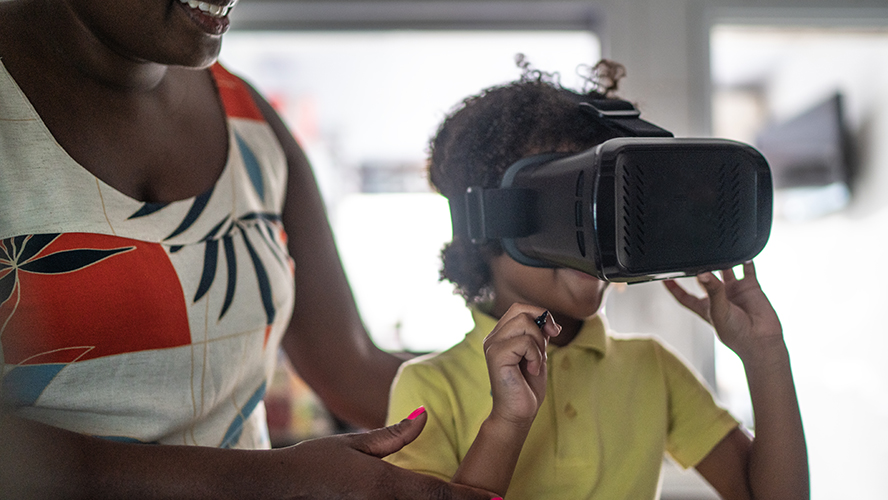
Researchers at UHN’s Donald K. Johnson Eye Institute (DKJEI) are changing how children with vision loss are treated. In this revolutionary trial, virtual reality (VR) rehabilitation conducted at home with remote support from doctors significantly improved visual perception—the ability to process and interpret visual information within the field of view—in children with hemianopia. This approach is both innovative and more accessible than traditional methods.
Hemianopia is a type of blindness that causes a child to lose vision in part of their field of view, either on the left or right side. This type of vision loss is permanent for about 60% of children who develop it after having a type of brain tumour, like an astroglial tumour. Though hemianopia poses a significant barrier to normal intellectual and social development, rehabilitation for it (called vision loss rehabilitation, or visual rehab) is not standard post-brain cancer treatment.
The DKJEI team evaluated a special VR program designed to help children with hemianopia regain visual perception in the affected part of their eyes. The program, called 3D-MOT IVR, uses audiovisual stimulation to help participants track objects across both the affected and unaffected portions of their visual field. Remarkably, the study found that as few as 6 weeks of short 20-minute sessions, every other day, led to sustained and noticeable improvements in functional vision. The team believes the improvements they observed could be even more significant with longer rehabilitation periods.
These results suggest that VR-based therapy, like 3D-MOT IVR, is a promising new approach to visual rehabilitation. This new approach could make vision rehab more accessible by allowing children to do therapy at home while recieving remote support, removing the barrier of having to travel to a clinic without compromising efficacy, safety, or adherence.
In recognition of how impactful this work is in the realm of pediatric brain tumour research, senior authors UHN’s Dr. Michael Reber and SickKids’s Dr. Eric Bouffet were awarded the Meagan Bebenek Foundation Award for Medical Excellence for this trial. Further studies like this one could not only help redefine standards of care, but also redefine what life with hemianopia—or, more accurately, what life with less visual impairment—looks like for survivors of pediatric brain cancer.
The first author of this study is Dr. Mariana Misawa, Clinical Fellow in the Department of Ophthalmology and Vision Science at the University of Toronto.
The senior author of this study is Dr. Michael Reber, Senior Scientist at Donald K. Johnson Eye Institute and Associate Professor in the Department of Ophthalmology and Vision Science at the University of Toronto.
This work was supported by Meagan Bebenek Foundation and UHN Foundation.
Misawa M, Bajin IY, Zhang B, Daibert-Nido M, Tchao D, Garcia-Giler E, Cheung K, Appel L, Nasir P, Reginald A, Tabori U, Bartels U, Ramaswamy V, Markowitz SN, Bouffet E, Reber M. A telerehabilitation program to improve visual perception in children and adolescents with hemianopia consecutive to a brain tumor: a single-arm feasibility and proof-of-concept trial. EClinicalMedicine. 2024 Nov 29;78:102955. doi: 10.1016/j.eclinm.2024.102955.




